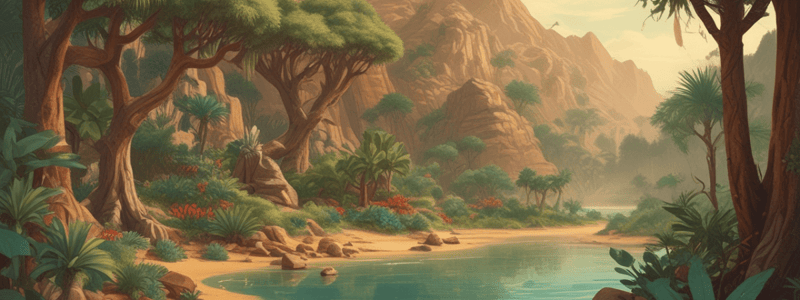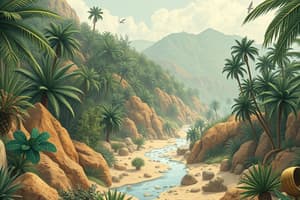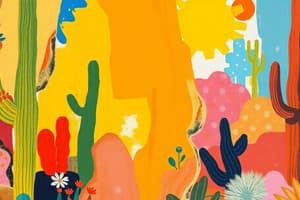Podcast
Questions and Answers
Match the ecosystem with its characteristic feature:
Match the ecosystem with its characteristic feature:
Desert Ecosystems = Characterized by low rainfall Tropical Rainforests = High temperatures and high rainfall Tundra Ecosystems = Treeless region with low temperatures Savanna = Grasslands with scattered trees
Match the ecosystem with its dominant vegetation:
Match the ecosystem with its dominant vegetation:
Taiga = Coniferous forests Savanna = Grasslands with scattered trees Desert Ecosystems = Cacti and succulents Tropical Rainforests = Diverse tree species
Match the ecosystem with its climate characteristic:
Match the ecosystem with its climate characteristic:
Tropical Rainforests = High temperatures and high humidity Tundra Ecosystems = Low temperatures and short growing season Desert Ecosystems = High temperatures and low humidity Boreal Forest = Cold winters and short growing season
Match the ecosystem with its geographic location:
Match the ecosystem with its geographic location:
Match the ecosystem with its soil characteristic:
Match the ecosystem with its soil characteristic:
Study Notes
Desert Ecosystems
- Characterized by low rainfall (<25 cm/year) and high temperatures
- Limited vegetation, dominated by cacti and succulents
- Adaptations:
- Deep roots to access water
- Waxy stems to reduce water loss
- CAM photosynthesis (open stomata at night)
- Fauna:
- Reptiles, insects, and small mammals
- Adaptations:
- Camouflage and burrowing to escape heat
- Specialized physical features (e.g., camel's hump)
Tropical Rainforests
- Characterized by high temperatures and high rainfall (>200 cm/year)
- High biodiversity and dense vegetation
- Stratification:
- Emergent layer: tallest trees
- Canopy layer: dense foliage
- Understory layer: shade-tolerant plants
- Forest floor: limited vegetation
- Fauna:
- Monkeys, birds, and insects
- Adaptations:
- Bright colors and mimicry for camouflage
- Specialized diets (e.g., fruit-eating birds)
Tundra Ecosystems
- Characterized by cold temperatures, short growing seasons, and low rainfall
- Low vegetation, dominated by grasses, mosses, and lichens
- Permafrost: frozen soil that limits root growth
- Fauna:
- Herbivores (e.g., caribou, reindeer) and carnivores (e.g., arctic fox)
- Adaptations:
- Thick fur and blubber for insulation
- Migration patterns to find food and shelter
Savanna
- Characterized by grasslands with scattered trees
- Tropical and subtropical regions
- Seasonal rainfall and drought
- Fauna:
- Grazing animals (e.g., zebras, antelopes) and predators (e.g., lions, cheetahs)
- Adaptations:
- Migration patterns to find food and water
- Specialized physical features (e.g., giraffe's long neck)
Taiga (Boreal Forest)
- Characterized by coniferous forests (e.g., spruce, fir) and cold temperatures
- Subarctic regions
- Short growing seasons and limited vegetation
- Fauna:
- Herbivores (e.g., moose, deer) and carnivores (e.g., wolves, bears)
- Adaptations:
- Thick fur and fat reserves for winter
- Specialized diets (e.g., berries, nuts)
Boreal Forest (Taiga)
- Same characteristics as Taiga
- Note: Taiga and Boreal Forest are often used interchangeably, but some sources distinguish between them as separate biomes.
Ecosystem Characteristics
- There are five types of ecosystem characteristics: dominant vegetation, climate, geographic location, and soil characteristics.
- Each ecosystem can be matched with one of these characteristics.
Types of Ecosystems
- Multiple ecosystems can be identified, including but not limited to:
- One with a distinct dominant vegetation
- One with a unique climate characteristic
- One with a specific geographic location
- One with distinct soil characteristics
Let me know if you need further clarification or if you'd like me to add more information!
Studying That Suits You
Use AI to generate personalized quizzes and flashcards to suit your learning preferences.
Description
This quiz covers the characteristics and adaptations of desert and tropical rainforest ecosystems, including vegetation, fauna, and specialized physical features.




